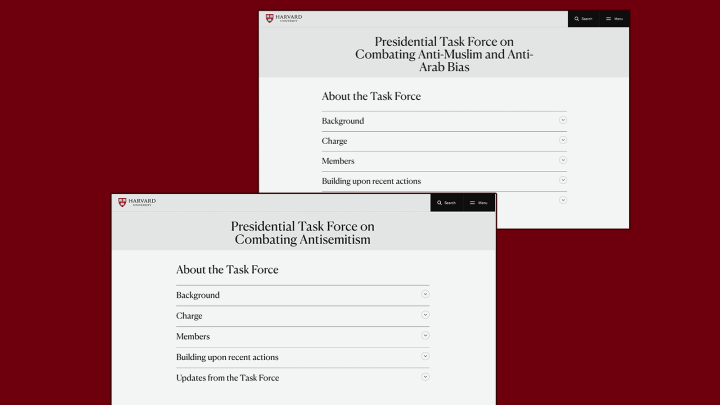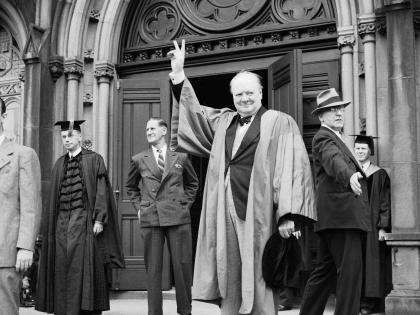Interim president Alan M. Garber today announced the preliminary recommendations from the task forces on combatting antisemitism and anti-Muslim, -Arab, and -Palestinian bias he created in January. In a message to the community, he wrote about the task force leaders’ “willingness to seek truth, to listen while withholding judgment, and to speak with kindness”—traits he called “a powerful example of how I hope we can proceed together.” He also cited “their optimism. After having spent months leading the task forces during what has been a strife-filled time for Harvard, they have developed a shared belief in the possibility that our community will change for the better, becoming more welcoming and inclusive.”
To that end, the task force on combatting anti-Muslim, -Arab, and -Palestinian bias highlighted findings from its 45 or so listening sessions, concerning these subjects, among others:
•Safety and security: “a deep-seated sense of fear among students, staff, and faculty,” characterized by “a state of uncertainty, abandonment, threat, and isolation, and a pervasive climate of intolerance.” Among other examples, the report noted, “Muslim women who wear hijab and pro-Palestinian students wearing keffiyehs spoke about facing verbal harassment, being called ‘terrorists,’ and even being spat upon. The issue of doxxing was particularly highlighted as a significant concern that affects not only physical safety and mental well-being, but also future career prospects.”
•Recognition and representation: “Participants expressed a strong desire for recognition and representation of diverse experiences and identities. Palestinians spoke about their identity being erased by campus-wide or school-specific messages and their pain not being acknowledged. They felt that the words ‘Palestine’ and ‘Palestinian’ had in effect become taboo on campus.” Respondents cited a lack of faculty and course offerings focused on Palestinian studies.
•Institutional response: “There was significant concern about the University’s perceived lack of response to pressures and damaging attacks from external agents, such as some high-profile donors. As a result, participants expressed a heightened sense of insecurity and felt unsafe, as the University seems to lack the requisite independence to protect them.”
•Freedom of expression: “Many Muslim, Arab, Palestinian, and pro-Palestinian students, staff, and faculty, including Jewish allies, said they continue to fear negative consequences if they speak publicly on issues they care about, especially those related to Palestine, human rights, social justice, and critiques of Harvard’s global engagements and investments.”
•Transparency and trust: “Participants stressed the need for greater clarity and transparency in the communication and enforcement of policies. They felt their experiences were not being acknowledged or, when they were, not given the same attention as those of other stakeholders. They also expressed concern that the University was struggling to protect independence of decision-making due to its fundraising considerations and that this in turn affected the University’s ability to uphold its stated values.
•Intellectual excellence: Participants raised concerns about the failure of the University to effectively support high-profile, structured intellectual engagements around contentious issues such as the ongoing Israeli-Palestinian conflict. They raised concerns about lack of support for faculty who have sought to undertake such intellectual work; they pointed to student efforts to achieve this that have gone unsupported by the administration;
The task force’s preliminary recommendations touched on short-term, immediately actionable items, with longer-term measures (possibly entailing “substantial changes in institutional policies, curricular and co-curricular improvements, and rethinking of the structure of religious life on campus”) to follow this fall. Current recommendations include:
•24-hour rapid, real-time helpline support for safety concerns;
•focused attention to doxxing, which the task force urged be denounced as “an abhorrent activity”;
•University statements of support for all community “groups equally, without overlooking affected groups”;
•expanding Palestinian studies curricular offerings and recruiting tenure-track faculty in support of this objective (and related Harvard-wide efforts to gather information on available academic resources and needs);
•clarifying policies and procedures for reporting bullying, bias, and discrimination;
•reaffirming the University’s commitment to free expression and open debate, and clearly, effectively communicating policies on protest and dissent to help address “the ambiguity about these policies that we heard exists among many students and even among some staff responsible for applying them.”
•revisiting the University’s 2018 statement of its declared values—and including community members’ safety as an explicit part of the values articulated;
•finding ways “to publicly highlight and clarify its adherence to fundraising best practices that protect academic freedom and institutional independence”;
•fostering conversations within Houses and dorms, facilitating faculty-organized community conversations on diversity and pluralism during orientation, addressing “religious illiteracy” as it is “a significant factor contributing to stereotypes and prejudices”; and
•strengthening interfaith and multifaith understanding of religious holidays, observances, dietary needs, and related factors.
Similarly, the task force on combatting antisemitism highlighted findings and recommendations from its 40-plus listening sessions, concerning these subjects, among others:
•Clarifying Harvard’s values: “[A]ntisemitism and anti-Israeli bias—like Islamophobia, anti-Arab bias, racism, misogyny, homophobia, or transphobia—are forms of hatred that have no place within the Harvard community.”
•Acting against discrimination, bullying, harassment, and hate: “The situation of Israeli students at Harvard has been dire. They have frequently been subject to derision and social exclusion.… The administration should explore methods to build support systems for Israeli students and to ensure sufficient ability to prevent, or if needed, capably and speedily address, such issues in the future.” Further, “We have heard disturbing reports that faculty members and teaching fellows discriminate against or harass students because they are Israeli or have pro-Israel views. Harvard should make clear that such behavior by instructional staff is contrary to University policy and will be subject to disciplinary action when it occurs.” The task force also cautioned about social media, and reported student belief that participation in extracurricular activities may be subjected to litmus tests—a form of exclusion the University must end.
•Improving disciplinary processes: Students report a lack of clarity on submission of complaints about antisemitic behavior, and “the policies of administrative boards and other disciplinary bodies vary widely across the University’s separate units, and there are significant disparities across units in the handling of disciplinary cases.” Many community members “doubt the University is committed to imposing substantive consequences for antisemitic expression or action.”
•Adopting measures on education and training of officers responsible for implementing equity, diversity, inclusion and belonging policies pertaining to antisemitism, and for new students and student leaders.
•Fostering constructive dialogue: Have University leaders attend talks by leaders with opposing viewpoints on controversial issues (a recommendation made by both task forces), foster faculty talks on “historic and contemporary relations between Christianity, Islam, and Judaism,” and encourage student conversations and research.
•Supporting Jewish life on campus by extending kosher meal services, and making accommodations for Jewish holidays or the Sabbath.
In accepting the task forces’ initial reports Garber wrote, “We must strengthen our ties with a sustained commitment to engaging each other with tact, decency, and compassion. Our learning cannot be limited to purely academic pursuits if we hope to fulfill our responsibilities to one another and to the institution that is our intellectual home.”
Anticipating their complete recommendations, including longer-term measures, during the fall term, he observed, “The work ahead of us will require concerted effort.”
His announcement was accompanied by a Harvard Gazette conversation with the task force leaders, available here.









